|
|
|
Sort Order |
|
|
|
Items / Page
|
|
|
|
|
|
|
| Srl | Item |
| 1 |
ID:
162545
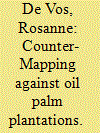

|
|
|
|
|
| Summary/Abstract |
This paper explores how villagers in Sambas District of West Kalimantan, Indonesia, attempt to protect their land rights against oil palm companies by engaging in mapping and spatial planning, in the context of the implementation of Indonesia's 2014 Village Law. Drawing on theoretical debates about counter-territorialization and counter-mapping, this paper considers how villagers use the Village Law to legitimate control over their territory. Although village-level spatial planning and mapping initiatives do not guarantee that land rights will be protected in the long term, spatial plans and maps can serve as leverage in negotiations with oil palm companies and government officials. Moreover, mapping and spatial planning help to organize people and boost discussions about land rights and different aspirations for land use. Proactive village-level spatial planning is necessary to find ways to maintain pre-existing ways of using land, and to counter notions of empty land, available for companies to claim.
|
|
|
|
|
|
|
|
|
|
|
|
|
|
|
|
| 2 |
ID:
125794
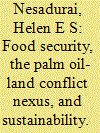

|
|
|
|
|
| Publication |
2013.
|
| Summary/Abstract |
This paper examines the nexus between food security and sustainability governance through a case study of palm oil. Palm oil's advocates claim that campaigns against palm oil and actions to halt its expansion due to sustainability concerns can undermine its food security role. However, palm oil expansion more directly undermines the food and livelihood security of rural and indigenous communities when land that rightfully belongs to, or has been used by, these communities is alienated to firms for oil palm cultivation with little or no consultation or compensation provided or alternatives considered. It is in this context that the paper examines whether the multi-stakeholder Roundtable on Sustainable Palm Oil (RSPO) is able to ensure that this commodity is cultivated in ways that minimise environmental damage and livelihood disruption, thereby safeguarding palm oil's contribution to food security. The findings are mixed. RSPO certification provides fairly comprehensive and progressive socio-environmental regulation that has enhanced sustainable production practises in this industry especially by the larger transnational plantation companies mindful of their global reputation. The RSPO is also far more responsive than governments have been to the land rights of rural and indigenous communities, providing due process for land claimants as well as recognising that these communities may have legitimate rights to land even if companies were awarded legal title by governments. However, multi-stakeholder regimes can be fragile, requiring a great deal of internal accommodation and trade-offs to work. Already, different interests in the RSPO are pulling in different directions while national certification systems have emerged that are less onerous compared to the RSPO even as the latter seeks to further enhance its sustainability credentials.
|
|
|
|
|
|
|
|
|
|
|
|
|
|
|
|
| 3 |
ID:
155524
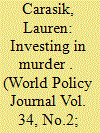

|
|
|
|
|
| Summary/Abstract |
Lawyer Lauren Carasik argues that the World Bank’s private-lending arm, the International Finance Corporation, has stoked a bloody land dispute in Honduras by funding the oligarch-owned agribusiness behind the violence. Now, with Carasik’s help, the Honduran farmers are taking the World Bank Group to U.S. federal court.
|
|
|
|
|
|
|
|
|
|
|
|
|
|
|
|
| 4 |
ID:
186568
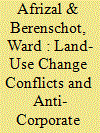

|
|
|
|
|
| Summary/Abstract |
While processes of land-use change have triggered conflicts across Asia, our knowledge of the responses of affected communities is largely based on case-studies. This review essay addresses this challenge by reviewing and synthesizing 49 studies of conflicts between rural communities and companies in order to identify salient characteristics of anti-corporate activism in Indonesia. We find that, in contrast to the ‘rightful resistance’ observed elsewhere, the strategies employed by rural communities in Indonesia are remarkably “rightless” as both their discourse and their conflict resolution efforts are marked by a remarkable irrelevance of laws, regulations and courts. Communities frame their claims mostly in terms of customary laws while largely relying on informal mediation by local authorities. We attribute this “rightless” character of land-use change conflicts to the weak legal protection of land rights in Indonesia and the relative powerlessness of communities in the face of collusion between authorities and companies.
|
|
|
|
|
|
|
|
|
|
|
|
|
|
|
|
| 5 |
ID:
155007


|
|
|
|
|
| Summary/Abstract |
This paper argues that violent conflict prominently impacts on land governance and so contributes to land conflicts in post-conflict settings. In the natural resources literature, the relationship between land and conflict is often explained in terms of environmental security or political ecology, and many have pointed out that the way land is governed in itself may be a source of conflict. However, less attention has been given to the effects of violent conflict on land and its governance in post-conflict situations. This paper argues that violent conflict affects land governance in many ways and that this in turn might contribute to further violent conflict. The argument builds around an extended case study of the Apaa evictions in Amuru District in Northern Uganda. The case illustrates how conflict around land is not just the result of resource scarcity and competition, but is the outcome of a combination of political, historical and social dynamics. Past policies on land and practices of land governance play a critical role in this. However at the same time, violent conflict has a critical impact on land access, transforms land governance authority and the rules applied. The land conflicts resulting from this, in turn, fuel ethnic tensions between local population groups, and grievances about those in power and the institutions that govern natural resources. The ways in which such problematic conflict-induced changes in land access and governance are dealt with by policymakers is critical for post-conflict stability.
|
|
|
|
|
|
|
|
|
|
|
|
|
|
|
|
| 6 |
ID:
147075
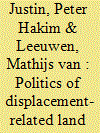

|
|
|
|
|
| Summary/Abstract |
Drawing on empirical evidence from Yei River County in South Sudan, this paper argues that, rather than a temporary phenomenon, displacement may lead to a drastic reorganisation of land occupation and governance. Such reorganisation may become strongly connected to broader political contention. In the case of Yei, existing legal frameworks and institutions are inadequate to deal with land conflicts resulting from massive displacement and return. Crucially, historical grievances result in the displaced no longer being perceived as powerless victims, but as agents of a Dinka agenda to (re)occupy territories in Equatoria, and as perpetrators in land conflict. Such politics of land-control and identity may turn land disputes between displaced people and returnees into a major source of instability. At the same time, those displaced people who are not well-connected politically may lose their land rights.
|
|
|
|
|
|
|
|
|
|
|
|
|
|
|
|
| 7 |
ID:
135023
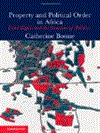

|
|
|
|
|
| Publication |
New York, Cambridge University Press, 2014.
|
| Description |
xvi, 416p.Hbk
|
| Contents |
B
|
| Standard Number |
9781107040694
|
|
|
|
|
|
|
|
|
|
|
|
Copies: C:1/I:0,R:0,Q:0
Circulation
| Accession# | Call# | Current Location | Status | Policy | Location |
| 057955 | 323.46096/BOO 057955 | Main | On Shelf | General | |
|
|
|
|
| 8 |
ID:
090313
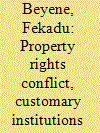

|
|
|
|
|
| Publication |
2009.
|
| Summary/Abstract |
This paper examines inter-ethnic conflict over grazing land previously accessed as common property. It presents results of a study undertaken in Mieso district of eastern Ethiopia where two ethnic groups maintain different production systems - pastoral and agropastoral. The historical change in land use by one of the ethnic groups, resource scarcity, violation of customary norms, power asymmetry and livestock raids are among the factors that have contributed to the recurrence of conflict. Particularly important is the role of raids in triggering conflict and restricting access to grazing areas. Socio-economic and political factors are responsible for power asymmetry and the increasing scale of raids. An increase in the frequency of violence and a decline in the capacity of customary authority in conflict management advance the role of the state in establishing enforceable property rights institutions. This will succeed only if policies and interventions are redirected at suppressing incentives for violence, establishing new institutional structures in consultation with clan elders of both parties, and building internal capacity to monitor conflict-triggering events.
|
|
|
|
|
|
|
|
|
|
|
|
|
|
|
|
|
|
|
|
|